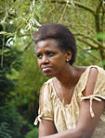A Rwandan living in Germany witnessing genocide from abroad.
I grew up in the village of Nyanza and have happy memories of my childhood there. My father was a doctor and was killed in 1959, but my mother didn't marry again, and I grew up with my mother and brother. In 1973 when I was in my 20s, I found my name on a list of Tutsis w
 ho were going to be arrested. I escaped overnight to Burundi. Four years later I sought asylum in Germany, where I raised a small family. My mother used to come and visit me every year for three or four months. She would talk and laugh with my German neighbour; she tended the strawberries and beans in the garden; she went to church services, to the parish fete; she was part of the community. Her last visit was from May-September 1993. I should have kept her with me. My mother thought that nothing would happen to her in Rwanda – she was an old lady, the oldest in the village, the lively and cheerful granny of orphan children. Who would dare to harm her? She was mistaken.
ho were going to be arrested. I escaped overnight to Burundi. Four years later I sought asylum in Germany, where I raised a small family. My mother used to come and visit me every year for three or four months. She would talk and laugh with my German neighbour; she tended the strawberries and beans in the garden; she went to church services, to the parish fete; she was part of the community. Her last visit was from May-September 1993. I should have kept her with me. My mother thought that nothing would happen to her in Rwanda – she was an old lady, the oldest in the village, the lively and cheerful granny of orphan children. Who would dare to harm her? She was mistaken.My mother died on 22 April 1994, in Nyanza where all the Tutsi were killed on that day. In all, 29 members of my family were killed then: my mother, my brother, his four children and his wife, my aunts, uncles, cousins, godchildren and friends. The only members of my family who survived were already living in Europe before 1994. Now I have nobody living in Rwanda. My trauma and pain in experiencing the genocide from Germany were indescribable. I would watch the television news, searching for the faces of my mother, brother and friends, hoping against hope to recognise my loved ones amidst the mass of refugees. But they were nowhere to be seen. My anguish was doubled by the fact that I knew my mother's murderer. His name was Eugène Nsanganira and he was one of our Hutu neighbours, long known to the family. He and I had played together as children. My mother taught his wife to sew, prepared his daughter for her wedding, looked after the two little ones when they were young. She used to take his family presents from Germany: soap, lotion, chocolate, biscuits, exercise books and pencils for the children. How was it that he gathered up those innocent people and marched them for an hour to prepared mass graves?
I went back to Rwanda in January 2001 to meet my mother's murderer. His sister didn't understand what her brother had done. His mother felt the same. She took me in her arms and we cried and cried together. It's difficult to explain my feelings about meeting the person who killed my mother. I can't pardon him. I don't want vengeance, but I need time and distance from him. I could possibly forgive him but he has refused to admit his responsibility for the genocide and for my mother's death. He doesn't show remorse. Yet he was my neighbour and he lived just beside us. Forgiveness is a two-way process. I am the victim and I feel sadness and mourn, but the killer must show remorse and sadness for what he or she has done.
-Eugénie Musayidire


2 Comments:
This site is amazing... thank you for these stories. I have been working on a film about Rwanda's healing & rebuilding process. These stories are a real inspiration for me.
Thanks very much, Eugénie, for your very affecting account of what you and your family suffered. It was wonderful that you were willing and able to approach the person who hurt your family in the spirit you did. I wish you well in your process of healing.
Maybe the rest of us could write and let our leaders know that we would like them to work as they have never worked before to make our nations known as active supporters and champions of human rights and justice, rather than as callous bystanders who act only when we perceive our own self-interest to be at stake.
Maybe we could, reminding them they are accountable to us, write and ask our leaders whether they now feel any remorse for not having used the great power and influence at their disposal to protect millions of defenceless people, and what they will do next time they learn a mass atrocity is being planned or executed.
Maybe we could write and let our leaders know, by the way, that we wish them to stop immediately their supply of arms, arms that invariably end up as instruments of murder and destabilisation.
Post a Comment
<< Home